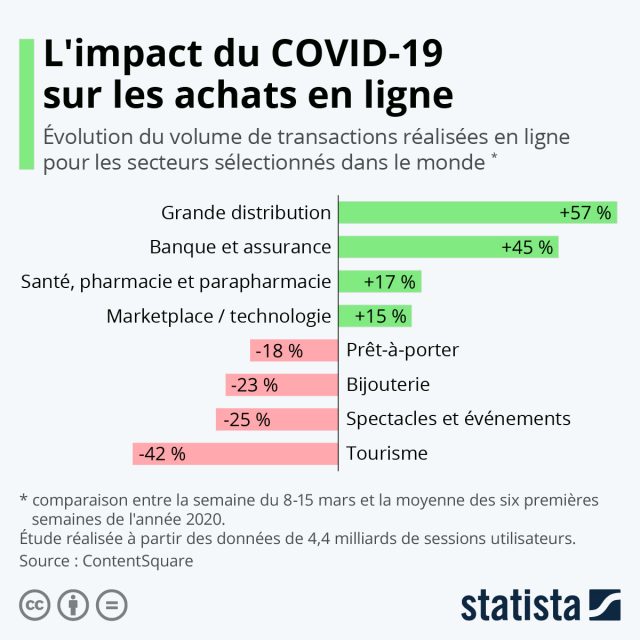For several years the figures of global e-commerce have only increased.
Long a small market benefiting only the pureplayer, the situation changed in the early 2010s with the advent of omnichannel and the growing interest of brick & mortar companies in digital commerce.
At present, and in particular following the health crisis that we are experiencing, the Internet has indisputably been able to limit the impact of this crisis on the economic situation of physical businesses. And this, although consumption has fallen and the purchasing habits of
consumers have changed drastically.
Indeed, the turnover of global e-commerce sales in the 1st quarter of 2020 only increased by 1,8% compared to the 1st quarter of 2019 (compared to +11,9% in Q1 2019/2018). A very low figure in addition to being misleading because the crisis/containment only started in mid-March, the first 2 months thus made it possible to support growth with an increase of +8% compared to January & February 2019.
However, and although growth has plummeted, an interesting turn has been taken by many companies during this COVID-19 crisis. By allowing these structures to become aware of the existing problems in their e-commerce ecosystem, but also to improve their platform. In the space of a few months, we thus assume a major advance in the digital sector that would have taken years in normal times. Accelerating both the scale and pace of e-commerce adoption in Europe in three key ways:
- By accelerating the adoption of digital commerce: Due to the crisis, each company has had to rethink its economic model or its working methods, thus accelerating their digital revolution. For the few refractory and latecomers to digital commerce, the transition had to be made in a hurry or risk finding themselves in even greater difficulty.
However, it is important to remember that even companies that have not yet started their digital transition should not aim for 100% omnichannel after two weeks. Each player must move forward at their own pace, through small initiatives and iterations, in order to evolve into a truly resilient company. - By accelerating the improvement of the customer experience: Faced with the intensification of online competition, the user experience offered by e-commerce companies has had to meet the challenge of attracting, satisfying and retaining even more clients.
Many e-merchants have thus invested in order to make their sites discoverable by search engines when their customers wish to make a purchase. But also, once customers are on the site, to improve it to make it more responsive and easy to use in order to meet or even exceed customer expectations. - By accelerating the opening to omnichannel: In this context of crisis, consumers have had no choice but to quickly and drastically change their consumption habits.
Favoring now consumer channels focused on simplicity and novelty. In the case of retail, innovation manifests itself by shifting to the “complementary” channels offered by omnichannel. Thus, and although this episode of crisis was temporary, nothing tells us that the resulting changes in consumption habits will be just as temporary. The physical trade could thus be forced to adapt durably to this level of mode of consumption offered by click & collection, e-reservation, drive, making appointments in store, etc.
Finally, and although this episode of health crisis has had a tragic effect both at the human and economic level, we must also see the positive in the negative. In particular the ability of companies to adapt quickly to an episode that is both extremely violent and improbable. This experience will also enable companies to become more resilient to future crises and the many developments to come in the sector.
SOURCES:
https://www.fevad.com/etude-sur-limpact-du-covid-19-sur-le-e-commerce-en-europe/
https://www.journaldunet.com/solutions/seo-referencement/1490231-l-impact-de-covid-19-sur-lecomportement-des-utilisateurs-et-le-e-commerce/
https://www.nextinpact.com/lebrief/42782/12556-la-fevad-revient-sur-les-consequences-de-lacrise-sanitaire-sur-l-ecommerce https://siecledigital.fr/2020/05/25/le-retail-a-lepreuve-de-la-crise-du-covid-19/
https://www.journaldunet.com/solutions/seo-referencement/1490231-l-impact-de-covid-19-sur-lecomportement-des-utilisateurs-et-le-e-commerce/
https://info.haas-avocats.com/droit-digital/quel-est-limpact-du-covid-19-sur-le-e-commerce

